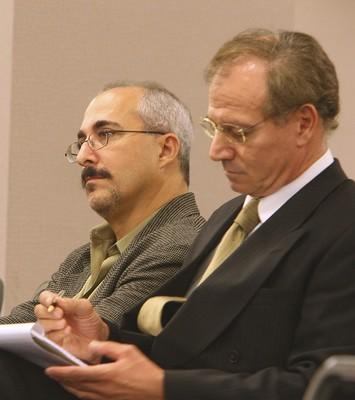Panel upholds plan for downtown arena

Backers of a proposed sports arena in downtown Las Vegas overcame a potential deal-killer Wednesday when a little-known state review panel upheld a plan to allow casinos as part of the project.
The unanimous decision by an appointed panel that convened for just its third time in 10 years endorsed a recent decision by the Las Vegas City Council to allow gaming near the proposed arena site south of Charleston Boulevard and east of Interstate 15.
Without the authority to include casinos, the proposed $9.5 billion, 85-acre project would have been in jeopardy, said an attorney arguing on behalf of REI Neon, the Michigan-based group trying to develop the now blighted site.
Opponents of the decision to authorize gambling as part of the arena development turned to the state panel, called the Review Panel of the Gaming Policy Committee, to overrule the City Council.
“This is very unusual for a body of appointed people to look over the shoulders of elected officials,” said Peter Bernhard, one of four members on the state panel. “This is a position of considerable power, but it is also a position of considerable responsibility.”
But in the case of the proposed arena plan opponents argued an intervention was justified because the City Council authorized the creation of a Gaming Enterprise District without any evidence that casino builders would make necessary road and infrastructure improvements to prevent already crowded streets like Charleston Boulevard from devolving into gridlock.
Attorney Charles Gardner called the proposed location, “the absolute worst place to put a casino … in this valley.
“Charleston Boulevard is a traffic nightmare,” he said.
Las Vegas resident Charles Weiner hired Gardner to make a case to the panel that the city should have waited until a builder or operator agreed to take responsibility for offsetting the community impact of casinos on the site before approving it as a suitable location for gambling.
The proposal calls for an arena, 1,500 residential units, 1.2 million square feet of commercial space, 6,000 hotel rooms and up to 300,000 square feet of gambling space.
The project site also overlaps an existing downtown arts district, which has prompted criticism from the art community. Weiner, described by Gardner as a camera-shy patron of the arts, didn’t speak during the hearing and only briefly before.
“The project is the wrong project at the wrong location at the wrong time,” Weiner said.
Arena backers appeared at the hearing with several lawyers on their side, including Las Vegas City Attorney Brad Jerbic and former U.S. Sen. Richard Bryan, now with the law firm Lionel Sawyer & Collins.
Near the beginning of the hearing Bryan argued that upholding the will of the City Council would help reverse decades of urban decay in Las Vegas, a phenomenon that has plagued cities across America since postwar families began fleeing central cities for outlying areas.
“The economic centrifugal forces that have driven millions of people to the suburbs … is an effect we have witnessed in Las Vegas as well,” Bryan told the panel, recalling childhood visits with his family to Mason Furniture. “The intervening six decades have not been kind to that area.”
Bryan and other REI supporters said the 1997 law that created the review panel and process for challenging gambling districts was meant to protect established suburban areas from encroaching neighborhood casinos, not put the brakes on redevelopment projects in blighted urban areas.
They pointed to comments of support from residents in neighborhoods closest to the proposed arena development and suggested opposition was led by people who lived further away, implying the opponents had less at stake in the dispute.
“(Weiner) lives in an enclosed community,” said Bryan, displaying a map that showed Weiner’s home near Rancho Drive and Oakey Bouelvard on the other side of Interstate 15 from the site. “It would be impossible for him to see at that elevation any aspect of this project, I’m sure.”
Opponents, however, said there is no guarantee the decision to allow casinos on the site would help reverse the blight in an area that has few houses, poor traffic flow and is plagued by social problems like homelessness and illegal drug use.
Gardner said the authorization could hinder efforts to revive the neighborhood if the arena developers don’t complete the project. That’s because the gambling designation would raise property values and make it more expensive for the city to undertake infrastructure improvements and eminent domain proceedings to upgrade the area as an alternative to the arena plan.
Once the gambling district is in place REI would have economic incentive to sell the newly rezoned land without doing the project, Gardner said.
“All they want to do is increase the property values then flip and that is an insult to this panel,” he said.
Gardner also criticized the City Council for accepting a traffic study that said traffic engineers were “cautiously optimistic” that future street upgrades could accommodate new traffic from the arena, casinos and other projects proposed in the plan.
“You put your life savings on black 20 and you can be as optimistic as you want to be and it is not going to help,” Gardner said. “It is just a gamble.”












